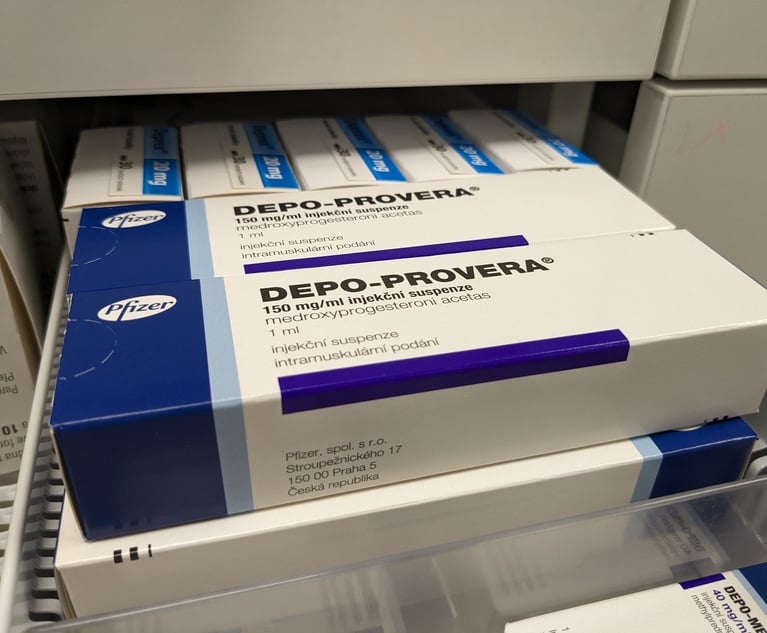 Bayer
BayerBayer Hires Sidley Austin to Probe Possible Data Breaches Related to Monsanto Scandal
The German company said it suspended its relationship with the public relations company FleischmanHilliard after news broke of its potentially illegal data collection on behalf of Monsanto.
May 24, 2019 at 04:12 PM
3 minute read
German agrichemical and pharmaceutical company Bayer has asked Sidley Austin to investigate possible data protection breaches by FleishmanHillard, a public relations and marketing company that was working on Bayer's public affairs.
Bayer has faced fierce public criticism in France and other EU countries after French media revealed that FleishmanHillard had drawn up a list of important stakeholders connected to the authorisation of glyphosate, a controversial pesticide. Glyphosate is owned by Monsanto, which Bayer acquired in 2016.
In a statement, Bayer said that it has asked Sidley's Brussels office to investigate the names on the list and the information stored about them. Bayer said that Sidley would contact all the people on the list before the end of next week to inform them that their details had been collected by FleishmanHillard.
The list, part of a stakeholder-mapping exercise, included the names of politicians and journalists in France, Germany, Italy, the Netherlands, Poland, Spain and the U.K. as well as some who are part of the European Commission. According to media reports, the list contains private information such as email addresses and telephone numbers as well as residential addresses. Storing this information without the person's approval would be a breach of EU data protection rules.
Stakeholder mapping is usual practice for public affairs consultants as a way of analysing support for or opposition to regulation or legislation and targeting lobbying efforts. It involves identifying people who have some influence on the outcome of a legislative or regulatory process. These can be people with a direct effect, such as politicians and regulators, or those who have an indirect effect, such as journalists, who influence public opinion.
Bayer has announced it has ended its relationship with FleishmanHillard apart from its marketing contracts.
The EU decided in 2017 to renew authorisation of the use of glyphosate, the active ingredient in RoundUp, for five years. This was despite a huge lobbying campaign to ban the pesticide because of fears that it causes cancer. France voted against the renewal and has vowed to ban the substance by the end of next year at the latest, once an alternative is found.
Bayer bought Monsanto in 2016 for $63 billion, but the company's share value has declined since then after Monsanto lost a number of lawsuits in the U.S. in which plaintiffs demanded compensation, arguing that RoundUp had given them cancer. In one recent case, a couple in California was awarded $2 billion. Monsanto is facing hundreds of similar claims for compensation.
|Related Stories:
Litigator of the Week: Meet the Man Behind the $2 Billion Roundup Verdict
This content has been archived. It is available through our partners, LexisNexis® and Bloomberg Law.
To view this content, please continue to their sites.
Not a Lexis Subscriber?
Subscribe Now
Not a Bloomberg Law Subscriber?
Subscribe Now
NOT FOR REPRINT
© 2024 ALM Global, LLC, All Rights Reserved. Request academic re-use from www.copyright.com. All other uses, submit a request to [email protected]. For more information visit Asset & Logo Licensing.
You Might Like
View All

From 'Confusing Labyrinth' to Speeding 'Roller Coaster': Uncertainty Reigns in Title IX as Litigators Await Second Trump Admin
6 minute read
New Class Action Points to Fears Over Privacy, Abortions and Fertility
Trending Stories
Who Got The Work
Michael G. Bongiorno, Andrew Scott Dulberg and Elizabeth E. Driscoll from Wilmer Cutler Pickering Hale and Dorr have stepped in to represent Symbotic Inc., an A.I.-enabled technology platform that focuses on increasing supply chain efficiency, and other defendants in a pending shareholder derivative lawsuit. The case, filed Oct. 2 in Massachusetts District Court by the Brown Law Firm on behalf of Stephen Austen, accuses certain officers and directors of misleading investors in regard to Symbotic's potential for margin growth by failing to disclose that the company was not equipped to timely deploy its systems or manage expenses through project delays. The case, assigned to U.S. District Judge Nathaniel M. Gorton, is 1:24-cv-12522, Austen v. Cohen et al.
Who Got The Work
Edmund Polubinski and Marie Killmond of Davis Polk & Wardwell have entered appearances for data platform software development company MongoDB and other defendants in a pending shareholder derivative lawsuit. The action, filed Oct. 7 in New York Southern District Court by the Brown Law Firm, accuses the company's directors and/or officers of falsely expressing confidence in the company’s restructuring of its sales incentive plan and downplaying the severity of decreases in its upfront commitments. The case is 1:24-cv-07594, Roy v. Ittycheria et al.
Who Got The Work
Amy O. Bruchs and Kurt F. Ellison of Michael Best & Friedrich have entered appearances for Epic Systems Corp. in a pending employment discrimination lawsuit. The suit was filed Sept. 7 in Wisconsin Western District Court by Levine Eisberner LLC and Siri & Glimstad on behalf of a project manager who claims that he was wrongfully terminated after applying for a religious exemption to the defendant's COVID-19 vaccine mandate. The case, assigned to U.S. Magistrate Judge Anita Marie Boor, is 3:24-cv-00630, Secker, Nathan v. Epic Systems Corporation.
Who Got The Work
David X. Sullivan, Thomas J. Finn and Gregory A. Hall from McCarter & English have entered appearances for Sunrun Installation Services in a pending civil rights lawsuit. The complaint was filed Sept. 4 in Connecticut District Court by attorney Robert M. Berke on behalf of former employee George Edward Steins, who was arrested and charged with employing an unregistered home improvement salesperson. The complaint alleges that had Sunrun informed the Connecticut Department of Consumer Protection that the plaintiff's employment had ended in 2017 and that he no longer held Sunrun's home improvement contractor license, he would not have been hit with charges, which were dismissed in May 2024. The case, assigned to U.S. District Judge Jeffrey A. Meyer, is 3:24-cv-01423, Steins v. Sunrun, Inc. et al.
Who Got The Work
Greenberg Traurig shareholder Joshua L. Raskin has entered an appearance for boohoo.com UK Ltd. in a pending patent infringement lawsuit. The suit, filed Sept. 3 in Texas Eastern District Court by Rozier Hardt McDonough on behalf of Alto Dynamics, asserts five patents related to an online shopping platform. The case, assigned to U.S. District Judge Rodney Gilstrap, is 2:24-cv-00719, Alto Dynamics, LLC v. boohoo.com UK Limited.
Featured Firms
Law Offices of Gary Martin Hays & Associates, P.C.
(470) 294-1674
Law Offices of Mark E. Salomone
(857) 444-6468
Smith & Hassler
(713) 739-1250









